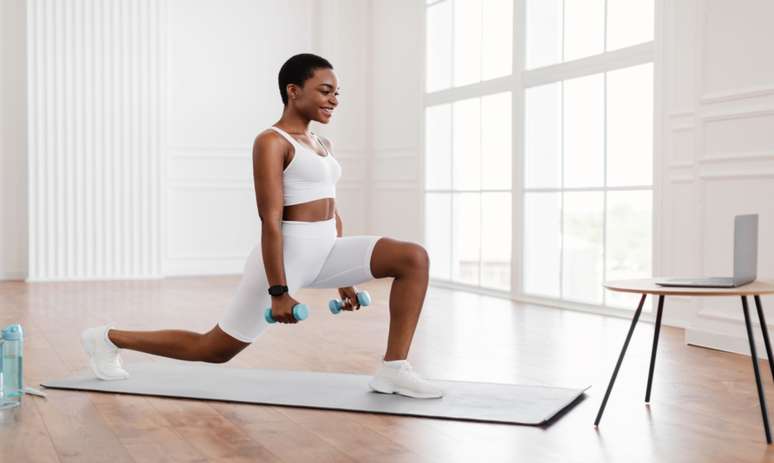Even with an intense routine, it is possible to take care of your body and your health. See 4 exercises to practice Pilates at home
Pilates is a practice that brings benefits that go far beyond improving physical fitness. This is because the method requires the mind and body to be in tune, which helps increase the body’s capacity and concentration.
Furthermore, breathing movements help fight stress and anxiety, which is extremely important, especially for those who live a hectic and stressful routine.
For those who spend a lot of time sitting, Pilates can be even more beneficial. According to Professor Josi Araújo, of Pure Pilates, “the body needs to balance muscle functions to stay active and aligned, preventing possible pain and injuries due to repetitive efforts.”
How to include pilates in your routine
But how can you reconcile the practice of Pilates with a hectic routine and little free time? Josi emphasizes that it is important to take care of your health at all times of the day, whether on the way home, at lunch or before going to work.
“Since many professions require working while sitting, the body does not receive metabolic stimuli and a sedentary lifestyle soon becomes a reality.” To achieve good results, the recommendation is to practice Pilates 2 or 3 times a week.
The practice combines movements with controlled breathing, which helps reduce the production of stress hormones and increase the production of well-being, such as endorphins.
Some exercises recommended by the teacher include diaphragmatic breathing, hamstring stretches, the cat exercise, and the spine roll against the wall. Watch:
Exercise 1: Breathing and diaphragm
Diaphragmatic breathing is a deep technique that helps reduce stress and anxiety. We need to take a break to have a moment of relaxation. This is because this interval is scientifically proven to be effective in preserving, promoting and restoring health.
It all starts with breathing and it is through this that we connect the body and mind, which is why this exercise is extremely necessary to continue with the others.
Starting position: Sit with your back straight and your hands resting on your lower ribs.
Execution: Inhale deeply through your nose, filling your abdomen and expanding your ribs. Then, slowly exhale through your mouth, gently contracting your abdomen and ribs, focusing on slow, deep breathing.
Repetitions: 8 to 10 times.
Exercise 2: Hamstring stretch
Starting position: In a supine position, with one leg extended and the other flexed to keep the lower back resting comfortably on the ground.
Execution: Wrap a rubber band or towel around your foot, pulling it towards your face, inhale deeply, and as you exhale, slowly extend your raised knee towards the ceiling.
Repetitions: 8 to 10 times, remembering to always respect the limits of your body.
Exercise 3: Cat exercise
Starting position: Four supports or cat.
Execution: In the correct position, inhale. As you exhale, she draws her spine toward the ceiling, forming an arch like an agitated cat. At this moment, the head should follow the movement and the gaze should be directed towards the center of the legs. When you return, he imagines removing your sitting bones (as if you want to stick out your butt) and looks forward. Exhale and resume the movement
Repetitions: 8 to 10 times.
Exercise 4: Roll your spine against the wall
Starting position: Standing
Execution: Place your head and spine against the wall, note which points are supported and which points of the spine are not supported. Leave your arms at your sides. Inhaling, as you exhale rotate your head and spine towards the floor. Let your arms weigh like pendulums. During the next exhalation, try to activate the abdomen and lift the spine, rolling vertebra by vertebra on the wall, paying attention to the head rising last.
Repetitions: 8 to 10 times.
Source: Terra
Ben Stock is a lifestyle journalist and author at Gossipify. He writes about topics such as health, wellness, travel, food and home decor. He provides practical advice and inspiration to improve well-being, keeps readers up to date with latest lifestyle news and trends, known for his engaging writing style, in-depth analysis and unique perspectives.









